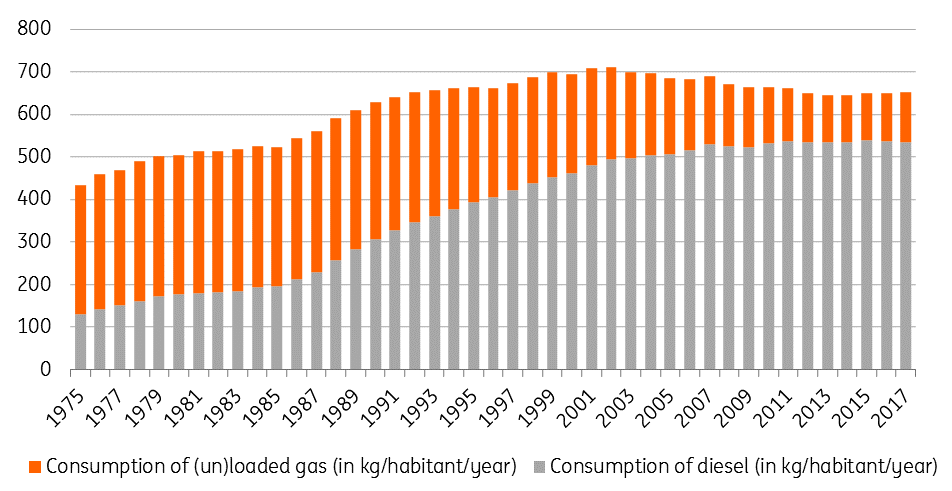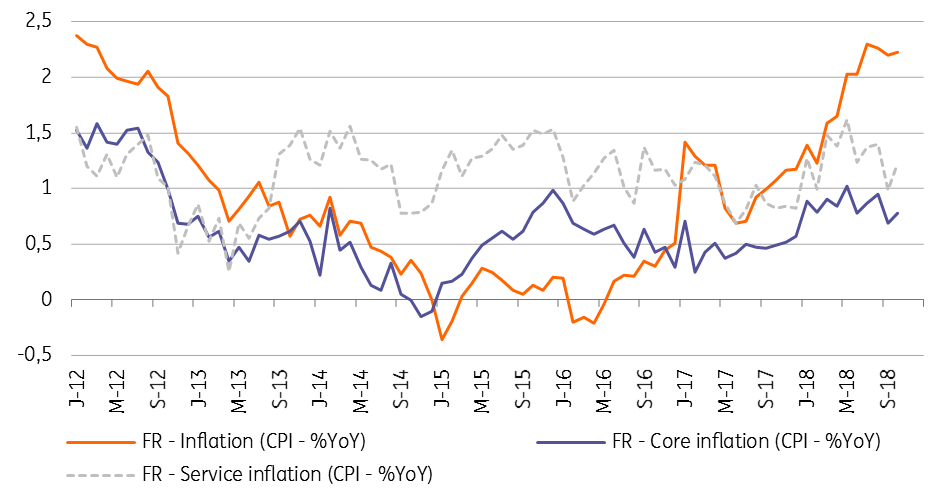France: Response to fuel protests is too little, too late
As a new type of grassroots activism sweeps across France, the government is swinging into action. But measures to reduce fuel costs are likely to be too little too late
| 0.8% |
French core inflation in October |
New funds to help drivers
Higher fuel prices have given rise to a new form of grassroots activism in France. This Saturday, a movement known as the 'yellow vests' plans to block more than 1500 roads across the country amid anger over a new tax on diesel vehicles, which along with higher oil prices over the summer has pushed prices at the pump to the highest level in years.
- Most of the demonstrations have not been registered, potentially leading to clashes with police forces.
- Interior Minister Christophe Castaner has called for local organisers to register to avoid fines or imprisonment.
The tax hike was one of the measures taken by Environment Minister Nicolas Hulot, who resigned two months ago. It followed years of pro-diesel policies, which brought diesel consumption from 30% of total gas consumption in 1975 to 82% last year. More than three private cars out of four are now using diesel.
The move has hit purchasing power and has been especially hard on lower-income households who have not yet benefited from President Macron's fiscal largesse. As a result, the government today announced that it would increase the budget aimed at energy transition, spending €0.5 billion on several new measures.
- The first is a conversion premium: those who want to switch to a low-emission vehicle already get €2000, lower-income households could get €4000 thanks to the new measure.
- The second is to temporarily increase support for the 5 million people driving a long way to work who already benefit from tax reductions. In parallel, there will be help for those using gasoline to heat themselves.

New inflation figures suggest the stress could fade
Still, most of these measures will only be valid from 2019 and won't be enough to stop the weekend protests, dealing another political blow to an already wounded Emmanuel Macron. The good news is that the fury should abate in coming months as oil prices settle below the €60 a barrel threshold. Inflation figures published this week confirm that French inflation was on a downward trajectory in October (at 2.1%) and peaked last summer at 2.3% in August. Currently, core inflation (0.8% in October) remains limited and mainly supported by service prices. If oil prices remain below €60 in the course of 2019, the impact of oil prices on inflation should become negative before the driving season next summer. This, together with scheduled fiscal measures for 2019, should restore sentiment. In the meantime, these grassroots protests are giving extreme parties a comfortable platform to kick off their European election campaign and could take consumer confidence to new lows in coming months.

"THINK Outside" is a collection of specially commissioned content from third-party sources, such as economic think-tanks and academic institutions, that ING deems reliable and from non-research departments within ING. ING Bank N.V. ("ING") uses these sources to expand the range of opinions you can find on the THINK website. Some of these sources are not the property of or managed by ING, and therefore ING cannot always guarantee the correctness, completeness, actuality and quality of such sources, nor the availability at any given time of the data and information provided, and ING cannot accept any liability in this respect, insofar as this is permissible pursuant to the applicable laws and regulations.
This publication does not necessarily reflect the ING house view. This publication has been prepared solely for information purposes without regard to any particular user's investment objectives, financial situation, or means. The information in the publication is not an investment recommendation and it is not investment, legal or tax advice or an offer or solicitation to purchase or sell any financial instrument. Reasonable care has been taken to ensure that this publication is not untrue or misleading when published, but ING does not represent that it is accurate or complete. ING does not accept any liability for any direct, indirect or consequential loss arising from any use of this publication. Unless otherwise stated, any views, forecasts, or estimates are solely those of the author(s), as of the date of the publication and are subject to change without notice.
The distribution of this publication may be restricted by law or regulation in different jurisdictions and persons into whose possession this publication comes should inform themselves about, and observe, such restrictions.
Copyright and database rights protection exists in this report and it may not be reproduced, distributed or published by any person for any purpose without the prior express consent of ING. All rights are reserved.
ING Bank N.V. is authorised by the Dutch Central Bank and supervised by the European Central Bank (ECB), the Dutch Central Bank (DNB) and the Dutch Authority for the Financial Markets (AFM). ING Bank N.V. is incorporated in the Netherlands (Trade Register no. 33031431 Amsterdam).